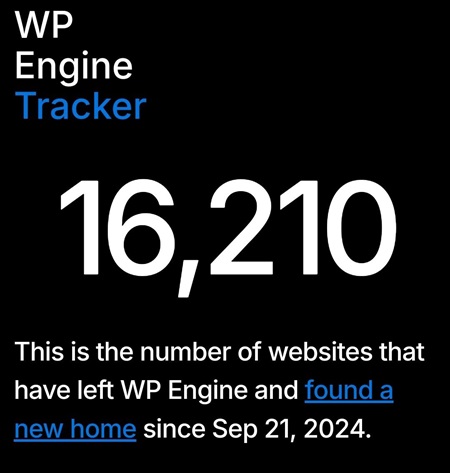Check out all these great offers of people that will migrate you off WP Engine: https://t.co/AKQGU7Hvpf
— WordPress (@WordPress) November 6, 2024
As tensions between Automattic, WordPress, and WP Engine escalate, it appears that WordPress websites are increasingly abandoning WP Engine for alternative hosting solutions. This shift comes on the heels of a series of contentious events that have unfolded since September, when Automattic’s CEO Matt Mullenweg publicly criticized WP Engine, labeling it a “cancer to WordPress” due to alleged interference with core functionalities essential for user data protection.
Recent reports indicate a significant migration of websites away from WP Engine. A user on X highlighted WP Engine’s downtime, prompting an official response from WordPress that cheekily remarked, “Looks like @wpengine can’t keep their own site up!” This post not only pointed out WP Engine’s reliability issues but also featured enticing offers for users considering migration from WP Engine to other hosts. These promotions were detailed in an article on the WordPress news site, showcasing various platforms for those looking to switch, among them Bluehost, DreamHost, Hostinger, Pressable, and more.
In a notable update, the number of sites that have migrated away from WP Engine surged from 15,080 to 16,210 within just 12 hours following WordPress’s announcement. This rapid exodus shows the growing discontent among users and reflects a broader trend of dissatisfaction with WP Engine amidst the ongoing conflict between the two entities. You can keep track of the exodus via this tracker.

This latest jab is just another chapter in what’s been a saga of big personalities and even bigger decisions between the WordPress ecosystem and WP Engine. It all began when tensions bubbled up around WordPress’ takeover of WP Engine’s ACF plugin. The situation quickly escalated into a full-blown conflict, with WordPress’s CEO, Matt Mullenweg, even taking to social media with criticism that eventually led him to delete a post targeting Ruby on Rails’ founder.
The drama reached another peak in mid-October, when whispers of WordPress Slack and WordPress.org account deactivations for certain developers surfaced. Then came the news that Matt Mullenweg was lawyering up, reportedly citing the First Amendment in what seemed like legal jousting.
And here we are, just weeks later, with WordPress actively encouraging migrations away from WP Engine and offering migration deals left and right. WordPress isn’t just fanning the flames — it’s practically installing fans on every side of the fire. The numbers speak for themselves: more than 16,000 sites gone in under a month, with more expected to follow.
The community’s response has been one of frustration and fatigue. Many developers and webmasters have expressed their desire for resolution, with some feeling caught in the crossfire of this escalating feud. There’s a longing for normalcy as users hope for an end to what has become a protracted battle between two major players in the WordPress ecosystem.
As this tech drama unfolds, it remains clear that the fallout is far-reaching. With more websites leaving WP Engine and community sentiments seemingly shifting against it, the future landscape of hosting within the WordPress community is uncertain. The rivalry between Automattic and WP Engine not only highlights significant operational challenges but also raises questions about governance and user rights within open-source platforms.
For now, all eyes are on that live tracker and on WordPress’ X account, where a bit more shade and some major fireworks might be just around the corner.
TechIssuesToday primarily focuses on publishing 'breaking' or 'exclusive' tech news. This means, we are usually the first news website on the whole Internet to highlight the topics we cover daily. So far, our stories have been picked up by many mainstream technology publications like The Verge, Macrumors, Forbes, etc. To know more, head here.

